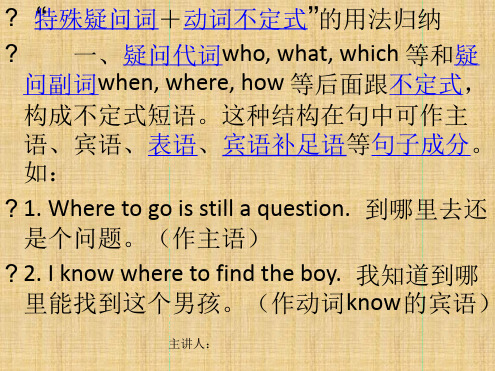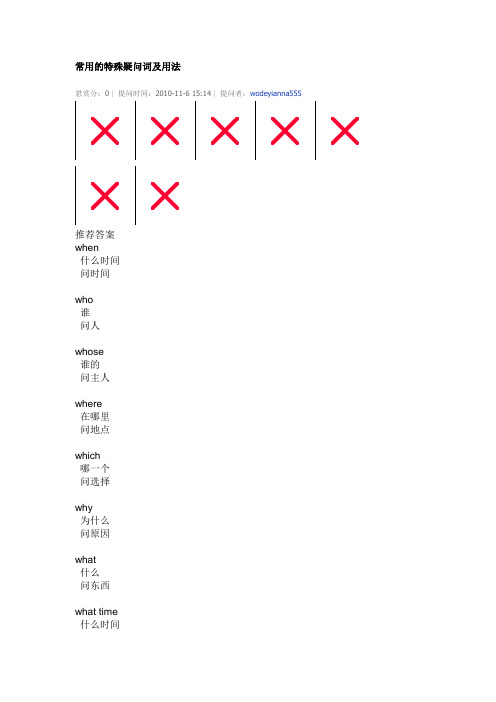“特殊疑问词+动词不定式”的用法归纳
- 格式:docx
- 大小:17.26 KB
- 文档页数:8


“特殊疑问词+不定式”的用法“疑问词+不定式”结构(question word + to-infinitive)4)疑问代词who, what, which等与疑问副词when, where, how等后面跟不定式,以及连接副词whether 与不定式连用构成不定式短语(在作用上相当于一个名词性从句,名词成分)。
这种结构在句中可作主语、宾语、表语、复合宾语的直接宾语、状语、同位语等句子成分。
注意:疑问副词why后不能跟动词不定式一、“疑问词+不定式动词”结构的几种功用:1)作主语Where to go is still a question、到哪里去还就是个问题。
(作主语时,谓语动词常用单数形式)When to hold the meeting has not yet been decided、Choosing what to eat is no longer as easy as it once was、选择吃什么,已经不像以前那么、、、When to start has not been decided、何时动身尚未决定。
What to read is an important question、该读些什么就是一个很重要的问题。
How to begin is more difficult than where to stop、如何开始比到哪里停止还困难。
2)作宾语(作用相当于名词性从句)A、用作动词宾语He asked how to open the box、她询问如何打开盒子。
She couldn’t think what to say、她想不出说什么。
He could not tell whom to trust、Our teacher explained how to use the word processor、老师向我们说明如何使用文字处理机。
I know where to find the boy、我知道到哪里能找到这个男孩。

常用的特殊疑问词及用法悬赏分:0 |提问时间:2010-11-6 15:14 |提问者:wodeyianna555推荐答案when什么时间问时间who谁问人whose谁的问主人where在哪里问地点which哪一个问选择why为什么问原因what什么问东西what time什么时间what colour什么颜色问颜色what about…怎么样问意见what day星期几问星期what date什么日期问具体日期what place什么地点问具体地址what for为何目的问目的what proportion什么比例问比例what is the cost(成本或花费)是多少问耗费what happen发生了什么问事件how…怎么样问情况how old多大how many多少问数量how much多少问价钱how about…怎么样问意见how far多远问路程how long多长问时间How soon多快,多久问时间How often /How frequently多久问频率How come怎么发生的问原因(或方式)How so/How’s that怎么,如何这样的?问方式,原因how what where why等特殊疑问词的用法悬赏分:0 |提问时间:2010-7-26 16:17 |提问者:彼岸花wp 这些特殊疑问词的用法,区别,谁教教我哈?谢谢推荐答案how怎么样what 什么where哪里why为什么意思区分就可以了特殊疑问句由疑问词开头,其构成是“疑问词+ 一般疑问句”。
特殊疑问句不能用yes, no来回答,而应根据它所询问的内容直接做出回答才行。
如:— What time is it, please? 请问几点了?— It's 7:30. 七点半了。
— Where are they? 他们在哪儿?—They're in the playground. 他们在操场上。

“特殊疑问词+动词不定式”的用法归纳一.由两部分构成:疑问词和动词不定式(wh-+to do)。
疑问词部分包括疑问代词who, whom, what, which和whose以及疑问副词when, where和how。
此外,连接词“whether”也适用.它主要具有以下几种功能:⑴当主语,如:● When to hold the meeting has not yet been decided.● Where to live is a problem.⑵当宾语,常接在forget, find out, discuss, decide, tell, teach, know, learn, wonder, remember等动词之后作宾语如:● We must know what to say at a meeting.● He could not tell whom to trust.● Do you know how to play bridge?⑶当表语,如:● The problem is where to find the financial aid.● The question is who to elect.⑷当名词同位语,如:● Tom had no idea which book to read first.● The question whether to confess troubled the girl.⑸用于宾语补足语,双重宾语。
某些动词后可接“sb.+ 疑问词 + 不定式”构成的双重宾语,这类动词常用的有advise, ask, show, teach, tell等如:● I can tell you where to get this book.● I ask her how to learn English.● He will advise you what to do.● Will you show me how to use the machine?(6) 作介词宾语:某些介词后面可接"疑问词+不定式"作宾语,这类介词常用的有about, as, from, in, of, on, with等。

八个特殊疑问词的用法口诀一、特殊疑问词的概述特殊疑问词是英语中用来提问特定信息的词汇,包括:what, when, where, who, whom, whose, why以及how。
它们在疑问句中起到引导作用,帮助我们获取需要了解的具体信息。
每个特殊疑问词都有其独特的用法和口诀,下面将逐一介绍八个特殊疑问词的用法口诀。
二、"What" –询问事物或情况"What"是一个广泛使用的特殊疑问词,常被用于询问事物或情况。
使用时可根据上下文指代不同内容。
1. What 是哪一个- What book do you want to read? (你想读什么书?)- What color is your car? (你的车是什么颜色?)2. What 什么东西/事情- What is that noise? (那是什么声音?)- What happened? (发生了什么事情?)三、"When" –询问时间点"When" 主要用于询问时间点,以展开对发生事件或活动的详细探究。
1. When 时间点- When did you arrive? (你什么时候到达的?)- When is your birthday? (你的生日是什么时候?)2. When 多久一次- How often do you go to the gym? (你多久去一次健身房?)- When do you wash your car? (你多久洗一次车?)四、"Where" –询问地点"Where" 用于询问事物所在的位置或位置方向。
可涉及具体地点,也可以用来指示方位。
1. Where 具体地点- Where is the library? (图书馆在哪里?)- Where did you park your car? (你把车停在哪儿了?)2. Where 方位- Where does the sun rise? (太阳从哪个方向升起?)- Where is the closest grocery store? (最近的杂货店在哪里?)五、"Who" –询问人的身份"Who" 主要用于询问特定人物或群体的身份或性质。

宾语从句特殊疑问词用法一、"疑问词+不定式"的构成:由疑问代词who,whom,what, which; 疑问副词when, how, where等+不定式构成。
Choosing what to eat is no longer as easy as it once was. 选择吃什么,已经不像以前那么简单了。
How to describe people is today's topic. 如何描述人物是今天的话题。
二、"疑问词+不定式"的功能:在句中可作主语、宾语、表语等成分。
1.作主语How to give advice in English is what I am trying to learn. 我正在努力学习如何用英语提建议。
2.作宾语①作动词的宾语We have to start somewhere if we want to learn how to write plays.我们要学习写剧本,总得有个开头。
②作介词的宾语We had better learn to make the right choices about what and how we eat. 我们最好能学会正确选择吃什么、怎么吃。
When you are trying to advise someone about what to do or what not to do, you can use should / ought to or should not /ought not to. 当你想要建议某人做什么或者不做什么时,你可以用should / ought to 或者should not / ought not to。
3.作表语My question is where to find the answer. 我的问题是在哪里能找到答案。
三、"疑问词+不定式"的使用方法。
不定式与疑问词不定式可以和疑问代词who, what, which及疑问副词when, how, where等连用,构成不定式短语,在句子中作主语、宾语、表语等。
现将这种用法归纳如下。
一、“疑问词+动词不定式”结构有两种形式:1. “疑问词+to+动词原形”I don’t know what to say. 我不知道说什么。
Can you tell me how to make a paper boat?你能告诉我怎样做一只纸船吗?2. “疑问词+名词+to+动词原形”I don’t know which topic to choose. 我不知道选哪个题目。
二、“疑问词+动词不定式”结构中的疑问词,包括疑问代词who, what,which 和疑问副词how, when, where等。
这些疑问词和不定式一起构成了不定式短语,这种结构可在句子中作以下成分:1. 主语Where to stay for the night is a problem. 晚上在哪儿过夜还是个问题。
What to do is not decided yetHow to begin is more difficult than where to stop2. 宾语We must know how to operate the machine. 我们必须弄懂如何操作这机器。
In one of his books, Marx gave some advice on how to learn a foreign language.在马克思的一本书中,他对如何学习一门外语提出了一些建议。
(作介词on的宾语)Do you know when to start? 你知道什么时候开始吗?I showed her which button to press. 我告诉她应该按哪一个按钮。
、有时还可用于介词后作宾语。
如:I found a book on how to avoid having a heart attack. 我找到一本书谈如何避免心脏病复发。
动词不定式的用法归纳以下是 8 条关于动词不定式的用法归纳:1. 哎呀呀,动词不定式可以用来作主语呢!就像“To learn a new language is a great challenge.(学习一门新语言是一个巨大的挑战。
)”,这不是很直白嘛!2. 嘿,它还能作宾语呢!比如说“I want to go shopping.(我想去购物。
)”,多简单易懂呀!3. 哇塞,作宾语补足语也是常有的事儿呀!像“He asked me to help him.(他叫我去帮助他。
)”,是不是一下子就明白啦?4. 你瞧,还可以作定语呢!像“There is nothing to worry about.(没什么可担心的。
)”,这不是挺清楚的嘛!5. 哎呀,作状语也没问题呀!比如“In order to catch the early bus, Igot up very early.(为了赶上早班车,我起得很早。
)”,这多好理解呀!6. 嘿,没想到吧,还能作表语呢!“My dream is to be a doctor.(我的梦想是成为一名医生。
)”,是不是很形象?7. 哇,和疑问词连用也超级棒呢!就像“How to solve the problem is very important.(如何解决这个问题非常重要。
)”,这多有意思!8. 最后呀,动词不定式还能有一些特殊用法呢!比如“had better do sth.(最好做某事)”,像“You'd better go to bed early.(你最好早点睡觉。
)”。
总之,动词不定式的用法可真是多种多样呀,大家可要好好掌握哦!。
动词不定式的用法总结动词不定式在中学英语中应用非常广泛,一方面在句中可起名词、形容词或副词的作用,同时也可在句中作主语、宾语、定语、状语和宾语补足语。
接下来为大家提供了以下:动词不定式的用法总结一动词不定式的形式一般是to +动词原形,但to有时要省去。
而动词不定式在具体运用时用不用to,取决于谓语动词的用法。
现就以下几方面介绍如下。
一、不定式结构1. 带to的不定式结构能直接跟带to的不定式结构的动词主要有:want, ask, tell, hope, learn, try, decide, forget, remember, like, love, stop, go, come等。
如:I want to go to the movies with you.我想跟你一起去看电影。
Don’t forget to turn off the light before you leave.在你离开之前别忘了关灯。
注意:动词不定式的否定形式是在不定式前直接加not,即not to do sth.。
如:Dave told me not to wake up Kate.大卫告诉我别叫醒凯特。
2. 不带to的不定式结构以下几种情况使用不带to的动词不定式:(1)在固定词组had better之后。
注意:had better的否定形式是had better not do sth.。
如:You had better go home now.你最好现在回家。
It’s cold outside. You’d better not go out.外面很冷,你最好不要出去。
(2)在let, make, see, feel, watch, hear等感官或使役动词后,要跟不带to的动词不定式作宾语补足语。
如:I made them give me the money back.我迫使他们把钱还给我。
I didn’t see you come in.我没看见你进来。
“ 【2 】特别疑问词+动词不定式”的用法归纳一.由两部分组成:疑问词和动词不定式(wh-+to do).疑问词部分包括疑问代词who, whom, what, which和whose以及疑问副词when, where和how.此外,衔接词“whether”也实用.它重要具有以下几种功效:⑴当主语,如:● When to hold the meeting has not yet been decided.● Where to live is a problem.⑵当宾语,常接在forget, find out, discuss, decide, tell, teach, know, learn, wonder, remember等动词之后作宾语如:● We must know what to say at a meeting.● He could not tell whom to trust.● Do you know how to play bridge?⑶当表语,如:● The problem is where to find the financial aid.● The question is who to elect.⑷当名词同位语,如:● Tom had no idea which book to read first.● The question whether to confess troubled the girl.⑸用于宾语补足语,双重宾语.某些动词后可接“sb.+ 疑问词 + 不定式”组成的双重宾语,这类动词常用的有advise, ask, show, teach, tell等如:● I can tell you where to get this book.●I ask her how to learn English.●H e will advise you what to do.●W ill you show me how to use the machine?(6) 作介词宾语:某些介词后面可接"疑问词+不定式"作宾语,这类介词常用的有 about, as, from, in, of, on, with 等.例如:He has no idea of how to answer this question. 他不知道如何答复这个问题.Della had only $1.87 with which to buy Jim a present. 德拉仅有$1.87为来吉姆买一件礼品.(which是关系代词)You have a number of topics from which to choose. 你有许多标题可以选择.(which是关系代词)二“特别疑问词+动词不定式”这种构造可以把复合句转为简略句.如:I don’t know what I’ll do next. = I don’t know what to do next.The doctor told him when he should take the medicine. = The doctor told him when to take the medicine.同样,因为“特别疑问词+动词不定式”这种构造相当于一个名词性从句,所以可用一致成分的从句代替,从而把简略句转换为复合句.改写时只需在疑问词后加上恰当的主语,并把不定式改为恰当的情势的谓语即可.如:Which to choose is important. = Which we should choose is important.The question is where to go. = The question is where we should go.三.“特别疑问词+动词不定式”这种构造可组成自力问句.如:What to do? 怎么办? How to get rid of the trouble? 若何摆脱困境?按照英语语法的习惯,疑问副词why 后不直接跟动词不定式,如:误:I don’t know why to choose that dictionary.正:I don’t know why you must choose that dictionary.但它可以接不带to的动词不定式,即动词本相,组成why do sth./ why not do sth. 确定情势是表示某动作是不必要的或没有意义的,而否认情势是表示向或人提建议和表达意见,相当于祈使句. Today is Sunday. Why not go out to relax yourself?Why pay more at other shops? We have the best value.演习:1.I have no idea when ___ her the bad news.A.will tellB.tellingC.tellD.to tell2. —Will you please show me how to do the role-playexercise?—Sure. Now let me tell you ____ first.A. which to doB. how to doC. when to doD. what to do3. I need your help because I don’t know ____.A. how to do itB. how to doC. what to do itD. what should I do4.—How are you feeling here?—It’s quite hot. I don’t kno w ____ to go or stay.A. howB. whenC. whetherD. where5.—I don’t know ____ to do with this maths problem.It’s too hard.— You can ask your classmates or teachers for help.A. whichB. howC. whatD. when6. — Millie, could you give me some advice? I d on’tknow ____.—Why don’t you wear this red shirt?A. when to wearB. what to wearC. how to wearD. where to wear7. I’m going on a field trip but I haven’t decided__________.A. what to doB. to do whatC. where to goD. to go where8 —This physics problem is too difficult. Can you show me ________, Wang Lin?—Sure.A. what to work it outB. what to work out itC. how to work it outD. how to work out it9. Excuse me. Would you please tell me ________ buy a digital camera?A. what toB. where toC. what I canD. where can I10. There isn't any difference between the two. I really don't know ________.A. where to chooseB. which to chooseC. to choose whatD. to choose which 用“疑问词+不定式”改写下列句子.1.How we should do it was discussed last night.__________ was discussed last night.2. I didn’t know where I should go.I didn’t know ____________.3. The difficulty was how we should cross the river.The difficulty was ____________ .依据汉语补全下列英语译文.1. 何时出发还不知道. ____________ is unknown.2. 我忘了该怎么办. I forgot___________.3. 我可以告知你哪里可以买到此书. I can tell you_________.4. Yao Ming 未决议下一步做什么.Yao Ming hasn’t decide ____________ next.5.She has decided ____________. (到哪儿工作.)6.Bill Gates knew ____________ (如何关心) children.7.I can’t decide ____________ (是否踢足球) or do homework.8. Paul knows ____________ (跟谁谈) for help.9.You should decide ____________ (做哪个) first.10.Simon just forgot ____________ (什么时光接) his friend.仁爱版英语九年级上册Unit3 Topic3测试题第二部分基本常识应用 (55分)Ⅰ.单项选择.(10分)( )1.—This physics problem is too difficult. Can you show me _____, Wang Li? —Sure.A.what to work it outB.what to work out itC.how to work it outD.how to work out it( )2.It is important _____ the piano well.A.of him to playB.for him to playC.of him playingD.for him to playing( )3.—Sorry, I can’t follow you. I beg your pardon?—_____A.You are welcomeB.That’s all right.C.Not at all.D.No problem.( )4.The old farmer felt like _____ a big house very much.A.to getB.getC.gettingD.got( )5.She _____ walk at night. How brave she is!A.dare toB.dares toC.dare notD.doesn’t dare to( )6.I will go to my doctor for _____ on healthy diet (饮食).A.an adviceB.some advicesC.any adviceD.some pieces of advice ( )7.It’s m y honor _____ to give a talk here.A.to inviteB.to be invitedC.invitingD.invite( )8.I usually go to the movies with my parents, but _____ alone.A.some timesB.sometimeC.at timesD.at time( )9.If you want to learn English well,i t’s useful to _____ befo re class and _____ after class.A.review; previewB.preview; reviewC.review; to previewD.preview; to review( )10.Listening, speaking and reading are all important _____ writing.A.besideB.besidesC.exceptD.expect第三部分写作 (25分)Ⅰ.词汇.(10分)(A)依据句意及首字母提醒补全单词.1.I am very w_____ in English, so I’m going to work hard at it.2.The plans have been under d_____.3.My English teacher told us many good m_____ to study.4.I’m sorry, I can’t follow you. Can you r_____ that?5.What a nice story! Can you r_____ it in English?(B)依据句意及汉语提醒完成句子.6.They ________ ________ ________(保持弹奏) the music late yesterday night.7.Please ________ ________ ________ ________(深呼吸) and relax yourself before you give aspeech in class.8.We can learn from ________ ________(犯错误).9.He is so excited that he can’t say ________ ________(完全的话).10.In order to ________ ________ (演习语法), I keep a diary.Ⅱ.句型转换.(5分)11.Every year the farmers plant many trees on those hills.(改为被动语态)Many trees _______ _______ on those hills _______ the farmers every year.12.I don’t know what I should do with the broken bike.(同义句转换)I don’t know what _______ _______ _______ the broken bike.13.Don’t give up learning English, it’s helpful to you.(同义句转换)Don’t _______ _______ English, it’s helpful to you.14.The children had a good time in Disneyland.(同义句转换)The children _______ _______ in Disneyland. 15.Jane would like to eat some fish.(同义句转换) Jane _______ _______ _______ some fish.。